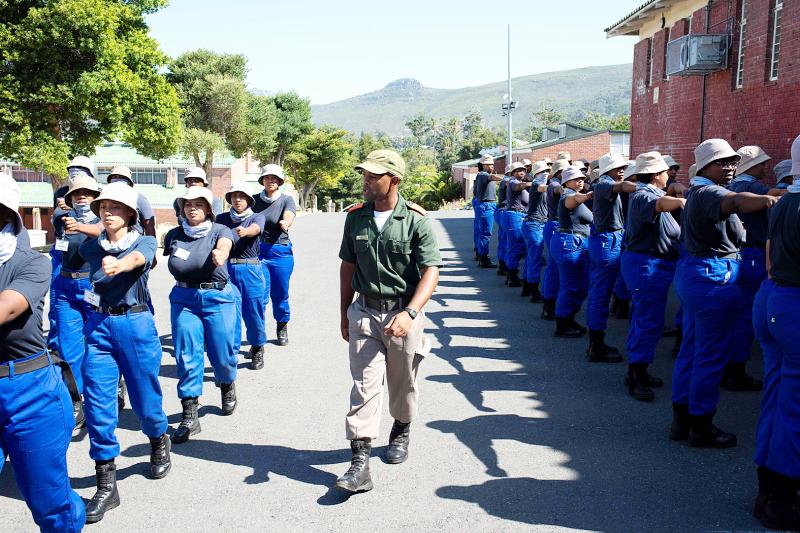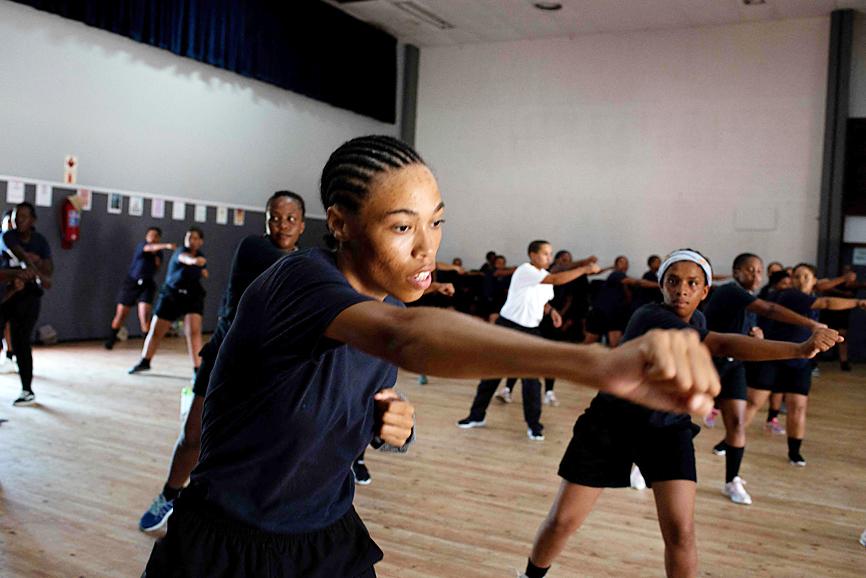A troop of 160 young women in cobalt blue uniforms and sand-colored bucket hats marched across a vast courtyard in lockstep. Two more faced the group to give military-style salutes, say prayers and hoist the South African national flag into the air.
What looked like mandatory military service was a sought-after program that takes young people from Cape Town’s toughest streets and sets them on a path to employment.
“I felt that my life had no direction, but since the moment I got here, got to experience everything that’s happening, a lot has changed,” said Siphokuhle Kapa, 23, a student at Chrysalis Academy.

Photo: AFP
Despite Cape Town’s reputation as a holiday paradise, its streets rank among the deadliest in the world.
All of South Africa has a horrific crime problem, but last year, Cape Town’s murder rate was the highest in the country, at 64 killings per 100,000 people.
By comparison, Johannesburg’s rate was 37, while New York City’s was 5.5.

Photo: AFP
The crime is driven by rampant gangs, combined with high unemployment — things that Gibson Jannecke wanted to escape.
“I have no history of drug abuse, no history of gangsterism, but it was a big factor in my life that affected me heavily,” Jannecke said, recalling his upbringing in the Western Cape town of Macassar.
“I couldn’t walk to school without being mugged. I could not go out in the street without my parents being worried about gunshots,” he added.
In 2011, he went to Chrysalis to study youth development. A decade later, he became an instructor at the academy.
In 2000, Chrysalis Academy was set up by the local government, in the shadow of the high-security Pollsmoor Prison — a jarring contrast to the leafy surrounding suburb of Tokai.
“When young people come here, we don’t look at them as drug addicts or poor people,” chief executive Lucille Meyer said.
“We look at them as whole human beings, but human beings who have lived difficult lives,” she said. “We are here as a platform to help them deepen their resilience and unleash their potential.”
Chrysalis runs three three-month courses per year for people aged 18 to 25, with two courses for men and one for women.
Anyone meeting the criteria can apply online.
Restrictions during the COVID-19 pandemic have hit all of the courses and the current intake of 162 women has also reduced numbers.
The boot camp-style courses have strict 4:30am starts each day, with a 9:30pm bedtime.
They focus on fitness and discipline, as well as mental well-being and vocational skills.
Mobile phones, drugs and cigarettes are prohibited.
Zenande Hambiso is looking to go into law enforcement.
The 24-year-old is from Kraaifontein, one of Cape Town’s domestic violence and murder hotspots, and has struggled to support her family, despite working long hours at a supermarket.
Hambiso initially found Chrysalis to be tough.
“I was struggling waking up at 4am. I don’t like waking up early,” she said.
“Sharing a room with a lot of people with difficult backgrounds and behaviors, it was very difficult, but now we get along,” she added.
“One day, I want to open my own investigation firm to help women who are being sexually harassed, raped and abused,” she said.
“There are abused women, and there are a lot of people who are being raped every day, and killed,” Hambiso said. “It’s really not a good thing what we are living through, so I am really trying to improve where I’m coming from.”

Drug lord Jose Adolfo Macias Villamar, alias “Fito,” was Ecuador’s most-wanted fugitive before his arrest on Wednesday, more than a year after he escaped prison from where he commanded the country’s leading criminal gang. The former taxi driver turned crime boss became the prime target of law enforcement early last year after escaping from a prison in the southwestern port of Guayaquil. Ecuadoran President Daniel Noboa’s government released “wanted” posters with images of his face and offered US$1 million for information leading to his capture. In a country plagued by crime, members of Fito’s gang, Los Choneros, have responded with violence, using car

Canada and the EU on Monday signed a defense and security pact as the transatlantic partners seek to better confront Russia, with worries over Washington’s reliability under US President Donald Trump. The deal was announced after a summit in Brussels between Canadian Prime Minister Mark Carney and European Commission President Ursula von der Leyen and European Council President Antonio Costa. “While NATO remains the cornerstone of our collective defense, this partnership will allow us to strengthen our preparedness ... to invest more and to invest smarter,” Costa told a news conference. “It opens new opportunities for companies on both sides of the

The team behind the long-awaited Vera Rubin Observatory in Chile yesterday published their first images, revealing breathtaking views of star-forming regions as well as distant galaxies. More than two decades in the making, the giant US-funded telescope sits perched at the summit of Cerro Pachon in central Chile, where dark skies and dry air provide ideal conditions for observing the cosmos. One of the debut images is a composite of 678 exposures taken over just seven hours, capturing the Trifid Nebula and the Lagoon Nebula — both several thousand light-years from Earth — glowing in vivid pinks against orange-red backdrops. The new image

OVERHAUL: The move would likely mark the end to Voice of America, which was founded in 1942 to counter Nazi propaganda and operated in nearly 50 languages The parent agency of Voice of America (VOA) on Friday said it had issued termination notices to more than 639 more staff, completing an 85 percent decrease in personnel since March and effectively spelling the end of a broadcasting network founded to counter Nazi propaganda. US Agency for Global Media (USAGM) senior advisor Kari Lake said the staff reduction meant 1,400 positions had been eliminated as part of US President Donald Trump’s agenda to cut staffing at the agency to a statutory minimum. “Reduction in Force Termination Notices were sent to 639 employees at USAGM and Voice of America, part of a